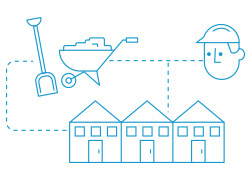The construction industry and its stakeholders are reeling after another large construction company entered liquidation earlier this month. 
With more than 20 major firms in the mix, hundreds of builders have now gone bust, and Victorian builder Langford Jones Homes is the latest victim.
It’s trying times for those in the sector, and while recent events have certainly played a part, conversations with industry leaders have unearthed several systemic issues that go deeper than the after-effects of the global pandemic.
As financial auditors and business advisers, we’ve been privileged to engage with these leaders who have shared their perspectives on what has been unfolding over the past 6 to 12 months, and the new challenges facing construction companies.
Let’s take a look at some of the challenges we’re seeing that are impacting the property and construction industry…
Challenge: Clients separating the commercial and operational functions of project management
There are various types of construction contracts and each carries its own level of risk – from design and construct (which is the riskiest as the contractor bears the risk of the design which is generally done by an independent design house) to early contractor involvement (where risk is slightly reduced) to construct only. The lowest risk is a cost-plus margin contract, though these are usually only awarded in desperate or urgent situations.
However harsh the contract may be, it dictates how the contractor and client relate to each other during the project. If something goes wrong, it’s all about who pays…and if the contract is biased towards the client, the contractor can quickly be placed in a very difficult predicament.
Challenge: The knock-on effect of collapsing entities
The collapse of major construction firms (such as Jaxon, Probuild, and Pindan) does not only impact the company itself.
Countless subcontractors have been left significantly out of pocket which ultimately ends up adding to the body count of liquidations or insolvencies.
The same applies to suppliers who do not easily recover when large invoices go unpaid from one or more valued clients.
Challenge: Lack of competition in the tier 1 contractor space
Australia’s property and construction sector comprise a relatively small pool of Australian-owned players compared to multinationals. These multinationals are still at the mercy of local supply chain issues, as well as a host of global economic constraints.
The ability of Australian-owned companies to compete at this level and ensure profits boost the local economy is a bone of contention that has had ongoing impacts on the competitive landscape and on morale in the industry.
Challenge: Eroding margins and other macroeconomic factors
Skilled labour shortages brought about by low migration and vaccination requirements, as well as building delays and rising material costs, have all contributed to the increase in company collapses.
The prices of raw materials (such as steel, bricks, and timber) have risen by up to 100% in some cases, which is a serious risk to builders who are locked into fixed price contracts with undesirable terms and conditions.
8 strategies for a more secure future
Fortunately, there are steps that solvent construction companies can take to mitigate these risks and weather the current storm.
Here are 8 considerations for owners and leaders within property and construction moving forward…
- Estimate VERY carefully – It’s critical to consider all external issues including supply chain risks, labour availability, wage, and salary escalation, and the impact of contract conditions before estimating a project.
- Value risk management – Project managers, commercial managers, and superintendents must be excellent risk managers and able to effectively deal with changes and external threats so costs do not escalate. This could require upskilling and more transparency in the business to keep communication flowing.
- Choose projects wisely – An unprofitable project is not worth its time or effort, so be selective when deciding which jobs to take on. Allow for some diversification with a mix of lower and higher-risk contracts, and make sure you have a sufficiently skilled workforce to deliver the project.
- Read the fine print – Be very wary of the terms and conditions of contracts. Do not accept terms that are difficult to control such as weather delays without cost recovery, consequential loss, process guarantees, extension of time provisions, and so on. Price weather elements properly, and be especially wary of liquidated damages clauses that are being used as a lever against many builders who are caught in a downward spiral.
- Build strong client relationships – Preference established or repeat clients, and try to build strong relationships early on in the contract. That way if there is a dispute, you can try to access chief decision makers to discuss a commercial resolution rather than going through legal channels.
- Identify issues early – Calling out issues and attempting to rectify them with a client early on provides better leverage if a project goes south. Know at all times whether you have full control over critical paths which could delay the completion of a project, with sufficient allowances to manage or minimise delays.
- Price variations appropriately – Always try to appropriately price the scope of works upfront. If the scope does change, ensure all costs are covered including delay costs and escalations.
Call for reinforcements
Property and construction leaders do not have to go it alone. You can invite skilled financial and business advisers to partner with your business to:
- Develop strategic plans that consider potential future scenarios

- Provide a friendly sounding board for decisions or challenges
- Manage risk in specific projects and across the business
- Act on growth strategies
- Evaluate options if cash flow is poor or debt surges
- Review and advise on business structures and whether they provide adequate protection
- Keep you up to date with industry changes
RSM’s property and construction specialists provide a range of valuable services to assist our clients in the sector – such as valuations to help with financing, financial health checks, internal audits (including project audits, cost to complete reviews, and internal process reviews), and risk assessments.
Our goal is to take the pressure off and help you build the confidence to take on the right projects so you can focus on managing and growing your property and construction business.
For more information on how RSM can assist your property and construction business, contact an industry expert at your local office or call AJ Neo directly at 08 9261 9167.

